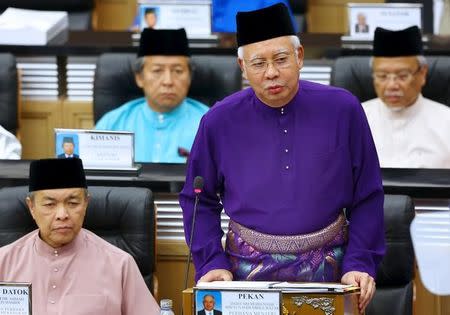Malaysia government to tell assembly about funds, critics see dodge

KUALA LUMPUR (Reuters) - Malaysia's government said on Thursday it would answer questions about millions of dollars found in the prime minister's bank accounts, but only on the last day of parliament next month, which critics decried as a tactic to dodge a grilling. Prime Minister Najib Razak is facing pressure over a graft scandal surrounding state fund 1Malaysia Development Berhad (1MDB) that erupted in July when the Wall Street Journal reported that investigators had found that nearly $700 million had been transferred into Najib's bank account. Najib and his government have declined to fully explain where the money came from or what it was for, though he denies wrongdoing or taking any money for personal gain. The state anti-corruption agency said the funds were a political donation from an unidentified Middle East benefactor. Azalina Othman Said, a minister in the Prime Minister's Department, told media the government would take on all questions about the funds on Dec. 3, the final day of the parliament session before a break until March. It was not clear whether Najib would answer questions himself or if he would appoint a minister to do so. The government had earlier declined to take any questions on the issue in parliament. A disclosure in parliament may reassure Najib's allies within his ruling party, the United Malays National Organisation, that he can put the troubles behind him. It may also ease concern among investors, who fear growing political instability amid calls from some critics for Najib to step down over the alleged corruption. But opposition members of parliament criticised the government for only fielding the questions on the last day of the session, giving no time for them to respond. "It would appear that Najib and the cabinet have a lot to hide," said Lim Kit Siang, parliamentary leader of the Democratic Action Party. "The entire system of good governance and checks-and-balance to ensure meaningful parliamentary control of the executive are being turned upside down to achieve their ulterior objective of avoiding full accountability." The opposition has been frustrated in its efforts to hold a vote of no-confidence against the government in the session. (Reporting by Praveen Menon; Editing by Robert Birsel)

